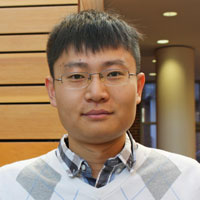BIOS students win travel awards for ASA conference
February 23, 2016
Lu Mao and Jingxiang (Sean) Chen, doctoral students in biostatistics at the UNC Gillings School of Global Public Health, have been accorded American Statistical Association (ASA) travel awards. The awards will support their presenting research at the 2016 ASA Joint Statistical Meetings (JSM) in Chicago, to be held July 30–Aug. 4.
Mao, who won an award from ASA’s biometrics section, will present his paper, “Semiparametric Regression Analysis of Interval-Censored Competing Risks Data.” Chen, whose award was from ASA’s biopharmaceutical statistics section, will present “Estimating Individualized Treatment Rules for Ordinal Treatments.”
Mao’s paper proposes a general class of semiparametric regression models that can evaluate the effects of interval-censored competing risks. As he describes it, such a risk is “an event or failure from one of several causes, for which the failure time is not observed exactly but rather known to lie in an interval between two successive examinations.”
The paper also illustrates how this type of analysis can be applied directly to a study of HIV/AIDS.
Mao’s adviser is Danyu Lin, PhD, Dennis Gillings Distinguished Professor of biostatistics at the Gillings School. More than 10 years ago, motivated by the applications of biostatistics to HIV/AIDS research, Lin made a grant proposal to develop statistical methods for interval-censored competing risks.
For the better part of a decade, Lin did not make much headway with this extremely difficult challenge. He was drawn into the problem again about three years ago, when the need to deal with this type of data in cancer clinical trials arose and he wrote it into a different grant proposal.
“I was very pleased when Lu agreed to work on this problem for his dissertation,” says Lin. “Because of his strong and unique skills, Lu was able to finally provide an elegant solution to the problem.”
Chen’s paper examines precision medicine, a term applied to health practitioners’ determining the best treatment rule for a patient based on his or her individual characteristics. Chen argues that although these individualized treatment rules have been applied primarily to binary treatment scenarios, there also may be room to apply a statistical learning model to ordinal treatment scenarios, such as trials involving several dose levels of a certain drug.
“This method helps detect the optimal treatment or dosage based on specific patient information,” said Chen. “It’s a very applicable topic that can be extended and used in medical practice.”
Michael Kosorok, PhD, W.R. Kenan Jr. Distinguished Professor and chair of biostatistics, is Chen’s co-adviser.
“I am pleased with the recognition Jingxiang has received,” Kosorok said. “He is doing very interesting and important work on the interface between precision medicine and machine learning.”
Chen also acknowledged the contributions and support of his other co-adviser, biostatistics professor Yufeng Liu, PhD.
Awards that allow students to attend conferences such as JSM are invaluable to the future progress of both the research they present and the students’ careers.
“Each discipline is divided into different sessions. That way, for each session, all the presenters and the audience members have some experience or are experts in your field,” Mao explained. “You can present your work and get valuable feedback, and you also get to look at other people’s work. In general, it offers recognition of your research accomplishments.”
Share
Gillings School of Global Public Health contact: David Pesci, director of communications, (919) 962-2600 or dpesci@unc.edu


